Who Can Prevent a Gonzaga-Baylor National Championship Game?
On Saturday, the men's NCAA tournament selection committee unveiled its top 16 seeds for the 2021 Big Dance, four weeks and a day ahead of Selection Sunday. There were not any huge surprises with the big reveal, and the prevailing theme was the same as it’s been for virtually the entire season: There’s Gonzaga and Baylor, then there’s everybody else.
The pandemic robbed us of a Gonzaga-Baylor matchup in December, yet it feels like a foregone conclusion that the two will meet up in Indianapolis for the national title. But should either get tripped up on the way to the championship game, which team from the rest of the pack is best positioned to pull off the upset?
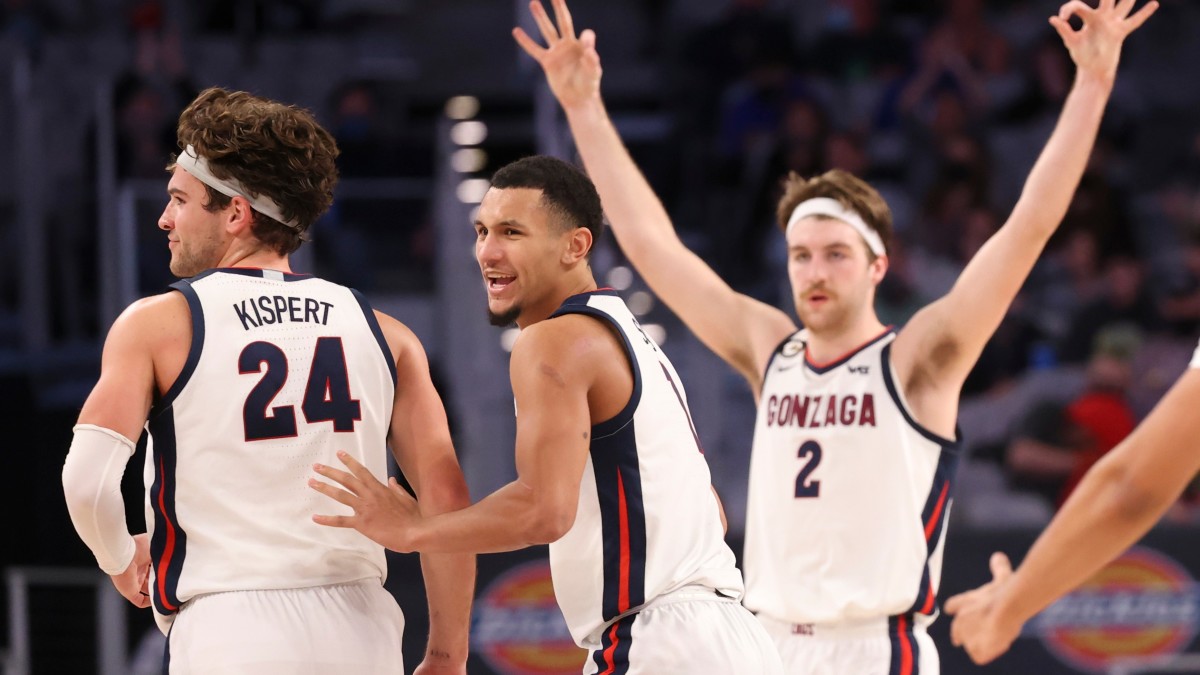
The answer almost certainly lies within the top 16 seeds of the tournament. This group is obviously subject to change between now and March 14, but now feels like a good time to handicap each team against the front-running Bulldogs and Bears. What follows is a ranking of each of the “other” top 16 teams, sorted by how likely that team would be to beat Gonzaga or Baylor come tournament time—plus a rundown of the script each opponent would likely have to follow to pull off an upset.
Take notes, seed Nos. 2–16: If you want to take down this year’s pair of Goliaths, this is how to do it.
14. Missouri Tigers
Overview: Missouri just snuck into the top 16 despite a blowout loss to Ole Miss on Feb. 10, then followed that up by dropping a home game to Arkansas in overtime hours after the committee put out its top 16. KenPom’s advanced stats don’t paint a particularly strong picture of the Tigers, ranking them 40th in offensive efficiency and 57th in defensive efficiency. Missouri doesn’t take care of the basketball well or generate steals often enough, ranking 238th in turnover margin.
How they beat Gonzaga or Baylor: The blueprint for Missouri to pull off an upset starts in the backcourt. Though the Tigers don’t shoot well from deep—they rank 273rd in three-point shooting percentage (31.5%)—Xavier Pinson and Dru Smith are a combined 38.8% from deep. Neither Gonzaga nor Baylor is among the nation’s best at defending from deep, so Pinson and Smith would need to be hitting from the outside in order for Missouri to have any chance.
13. Texas Longhorns
Overview: The Longhorns have dropped four of their last seven games since sprinting out to a 10–1 start, including an 83–69 home loss to Baylor on Feb. 2. Texas trailed by seven at halftime and briefly took a two-point lead early in the second half before the Bears regained control. Texas ranks 201st national in assist-to-turnover ratio and 229th in turnover margin, and 17 turnovers against Baylor were too much to overcome.
How they beat Gonzaga or Baylor: First things first, Texas can’t be careless with the ball. The Longhorns rebound well and defend at all three levels (three-pointers, mid-range and at the rim) well enough to compete with either behemoth. Gonzaga and Baylor force opponents into mistakes, but a lot of Texas’s miscues are self-inflicted. Cleaning up that sloppiness would go a long way in increasing its upset potential.
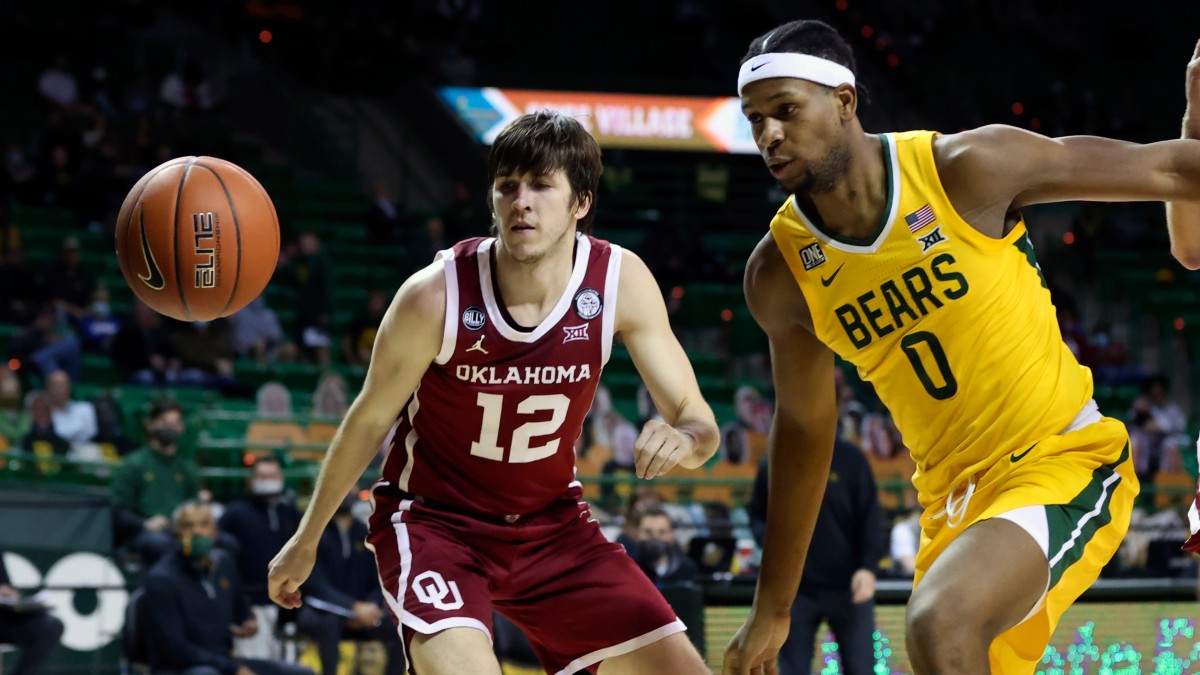
12. Oklahoma Sooners
Overview: Oklahoma never had a chance in its Jan. 6 meeting with Baylor, losing 76–61. Baylor is a particularly bad matchup for the Sooners, who don’t defend the three-point line well, ranking 295th nationally in that category. Baylor shoots 43.9% from deep as a team, best in the country.
How they beat Gonzaga or Baylor: As Austin Reaves goes, so go the Sooners. Oklahoma’s leader in points, rebounds and assists had 19 points, seven boards, five assists and two steals against Baylor, but shot 2 for 9 beyond the arc with four turnovers. Against Gonzaga, the Sooners would need to dictate the tempo and slow the game down, as the Bulldogs love to get out in transition and can easily go on game-swinging runs.
11. Texas Tech Red Raiders
Overview: The Red Raiders gave Baylor its closest game of the season, losing by eight points at home on Jan. 16. A plodding first half in which the Bears led 26–18 turned into a track meet in the second half, with each team scoring 42 points. Texas Tech took a one-point lead with just over seven minutes to play before Baylor ended the game on a 24–15 run.
How they beat Gonzaga or Baylor: Turning the ball over 20 times is a recipe for disaster against Baylor, so step one for Texas Tech is to clean up mistakes. It was an uncharacteristic performance in that department, as Chris Beard’s team ranks fourth nationally in turnover margin. Texas Tech ranks 284th in tempo while fast-paced Gonzaga ranks seventh, so in a matchup with the Bulldogs, the Red Raiders would need to run the shot clock down and take care of the ball to keep the game low-scoring.
10. Villanova Wildcats
Overview: As Saturday’s 86–70 loss to Creighton showed, Villanova needs to get better on the defensive end if it’s going to make a deep run in March. The Bluejays shot 59.3% from the field and were 12 for 26 on three-point attempts. The Wildcats have dropped two of their last four since starting out 11–1.
How they beat Gonzaga or Baylor: Villanova’s strengths and weaknesses are fairly straightforward. The Wildcats are great on offense, ranking fifth nationally in efficiency per KenPom, but can be a wreck on the defensive end. Villanova is 317th in opponents’ three-point shooting percentage and 335th out of 340 teams in blocked shots. It’s hard to imagine Gonzaga or Baylor not thriving against this defense, but what Villanova has going for it is its perimeter shooting and ability to take care of the basketball. Those two traits will keep a team in just about any game.
9. West Virginia Mountaineers
Overview: West Virginia has had two games against Baylor postponed, so we’ll have to wait until the Big 12 tournament for these two to match up (at the earliest). The Mountaineers did, however, give Gonzaga its closest game of the season in an 87–82 loss back on Dec. 2. That game was tight the entire way, with West Virginia leading by as much as nine before fading in the final minutes.
How they beat Gonzaga or Baylor: The Mountaineers are among the most efficient offenses in the country, though they rank just 59th in defensive efficiency and don’t generate steals like the “Press Virginia” teams of old, ranking 146th nationally. Against Gonzaga, West Virginia was able to grab 14 offensive rebounds, though, providing much-needed extra possessions that have not come via creating turnovers like in previous years. Pushing Gonzaga to the brink will give West Virginia plenty of confidence in a potential rematch, and the same goes for a potential meeting with Baylor.
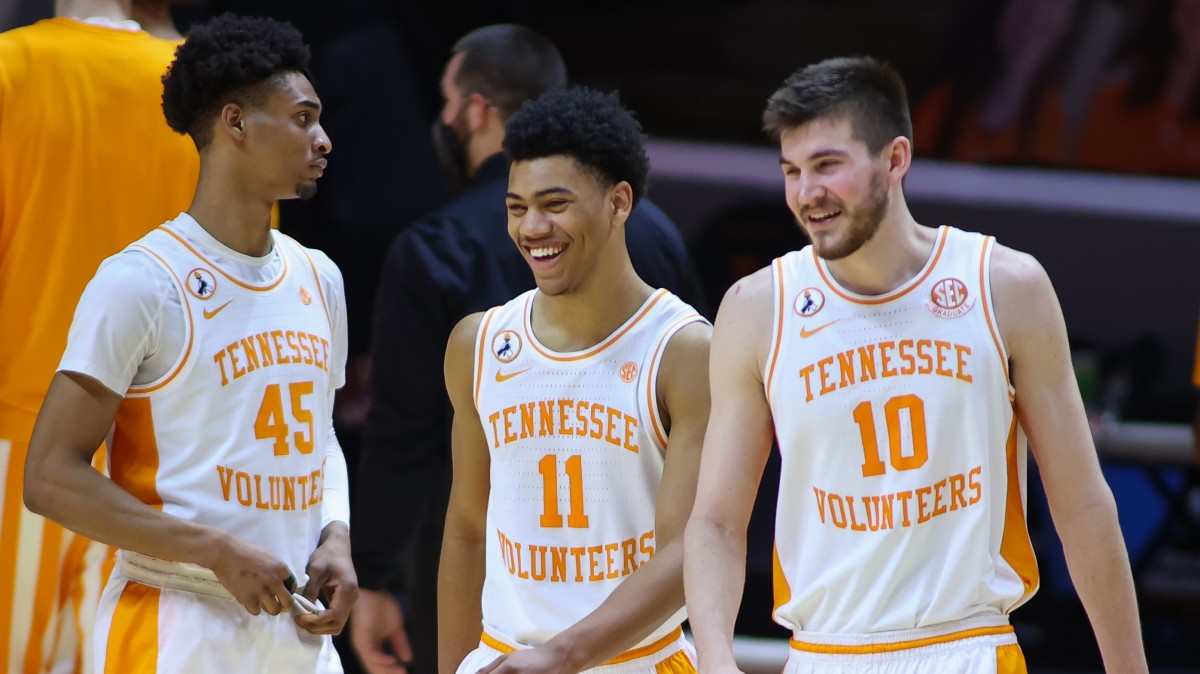
8. Tennessee Volunteers
Overview: Tennessee has lost some shine after dropping four of its last eight games, only topping 65 points three times in the span. The Volunteers defend at an elite level and take care of the basketball well. They’re not a deep bunch, with only seven players averaging 10 or more minutes per game, but it’s an extremely balanced group. Each of Tennessee’s seven rotation players have attempted between 130 and 154 shots this season.
How they beat Gonzaga or Baylor: Balance will be key against the Bulldogs or Bears, though freshman guard Jaden Springer would have to shine in a matchup against Gonzaga’s Jalen Suggs or Baylor’s Jared Butler for the Volunteers to pull off an upset. Springer has emerged as one of the best guards in the country, leading the team in scoring and steals while shooting 51.4% from the field. Tennessee protects the rim well, ranking 27th in blocked shots.
7. Iowa Hawkeyes
Overview: Most of the teams I view as having the best chance at topping Gonzaga or Baylor play stout defense. That’s not the case for Iowa, which has the most efficient offense in college basketball but ranks 108th on the defensive side of the floor. Iowa lost to Gonzaga, 99–88, Dec. 19 on a neutral floor, in a game that Gonzaga led by double digits for most of the way.
How they beat Gonzaga or Baylor: The recipe for success is simple for Iowa: Turn things into a shootout. The Hawkeyes won’t be able to slow the Bulldogs or Bears down, so they might as well lean into their strengths. National Player of the Year favorite Luka Garza would need to be on, as would shooters Joe Wieskamp and Jordan Bohannon. Iowa may not defend well, but ranks 42nd in blocked shots, so not allowing easy buckets at the rim would be necessary to pull off an upset.
6. Virginia Cavaliers
Overview: Virginia’s profile has the look of a team that can cut down the nets in Indianapolis. The Hoos are one of six teams ranked in the top 22 in offensive and defensive efficiency, along with Gonzaga, Baylor, Michigan, Illinois and Houston. They’ve won 11 of their past 13 games and are trending in the right direction, though they stumbled in a 21-point road loss to Florida State Monday night.
How they beat Gonzaga or Baylor: The glaring black mark on Virginia’s team sheet, of course, is the 23-point loss Gonzaga handed the Cavaliers on Dec. 26, in a game Virginia trailed by as many as 33 points. A rematch would certainly provide a closer game, but it’s tough to build a case for Virginia to be able to compete with the top dogs with that loss in mind. Forward Jay Huff dealt with foul trouble and played just 13 minutes in that game. A stronger presence from him wouldn’t erase the 23-point deficit, though it’d be a good place to start.
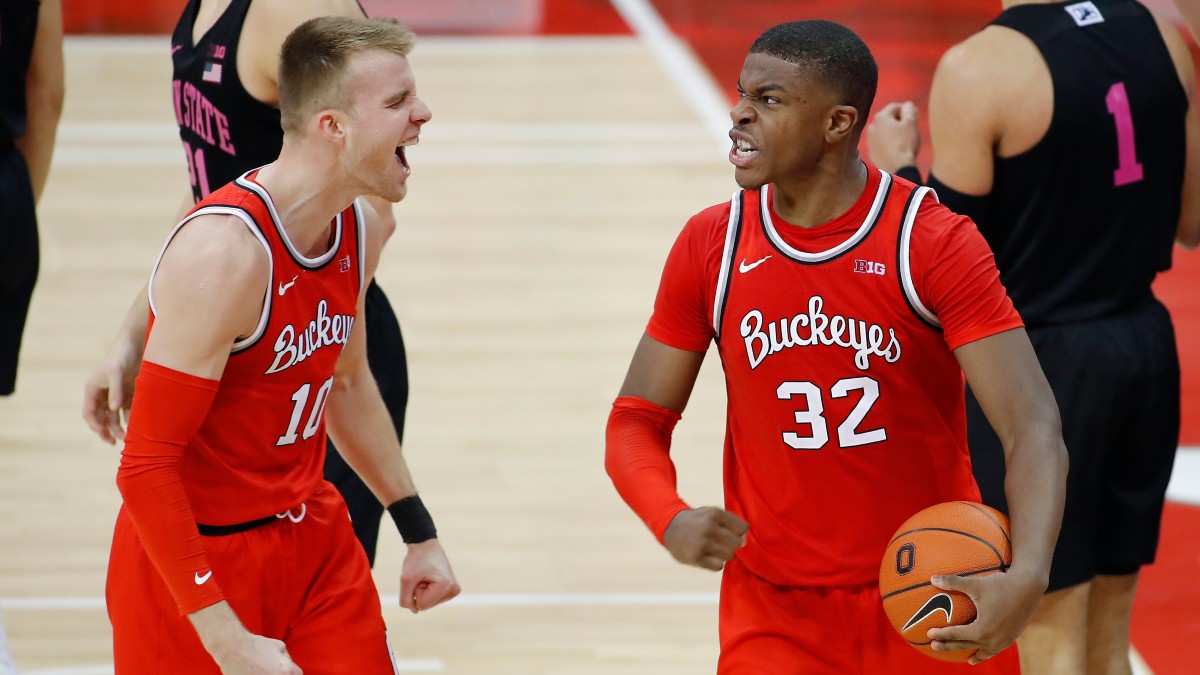
5. Ohio State Buckeyes
Overview: The Buckeyes have caught fire over the past month, winning six straight and nine of their past 10 games. That run includes road wins over Rutgers, Illinois, Wisconsin and Iowa, putting together as impressive a résumé as any team in the country.
How they beat Gonzaga or Baylor: As good as they are, the Buckeyes don’t rank among the game’s best defensively. Ohio State ranks 61st in defensive efficiency, 164th in opponents’ three-point shooting percentage, 151st in turnover margin and 138th in blocked shots. They are elite on the offensive end, led by forward E.J. Liddell. Liddell has many strengths, but against Gonzaga, his ability to draw fouls and get to the free throw line would be particularly valuable against a Bulldogs lineup that isn’t very deep.
4. Houston Cougars
Overview: A surprising road loss to East Carolina aside, Houston has rolled through the American conference this season, with Quentin Grimes and Marcus Sasser forming a strong backcourt duo. Houston hasn’t faced many stout offensive teams so far and likely won’t see much stiff competition between now and the NCAA tournament.
How they beat Gonzaga or Baylor: The Cougars make their bones on the defensive end, and they’d need to continue their stingy ways to upend Gonzaga or Baylor. Houston leads the country in opponents’ three-point shooting (25.5%) and overall field goal percentage (36.5%), while also ranking sixth in rebounding margin. Houston plays at a slowed-down pace, so keeping Gonzaga from running out on the fast break would also be necessary.
3. Illinois Fighting Illini
Overview: Illinois has ripped off five straight wins after suffering back-to-back defeats to Maryland and Ohio State, including victories over Iowa and Wisconsin. The Illini lost to Baylor by 13 on a neutral court on Dec. 2, in what was a five-point game with under nine minutes to play before the Bears finished on a 26–18 run.
How they beat Gonzaga or Baylor: Ayo Dosunmu and Kofi Cockburn have been outstanding for Illinois this year, but they were off their game against Baylor. Cockburn dealt with foul trouble and played just 18 minutes, while Dosunmu shot 6 for 18 with three turnovers. Should they run into Gonzaga or Baylor in March, these two will need to be at their best. Perhaps Illinois’s biggest strength is its rebounding (it ranks fifth in rebounding margin), so Cockburn avoiding picking up early fouls again is paramount.
2. Michigan Wolverines
Overview: Playing its first game in more than three weeks, Michigan looked rusty in a big matchup at Wisconsin on Saturday. All that rust was completely shaken off in the second half, when the Wolverines outscored the Badgers, 40–20, for an impressive comeback win. Michigan sits atop the best conference in America and has its eyes set on a return to the Final Four.
How they beat Gonzaga or Baylor: Michigan’s frontcourt duo of Isaiah Livers and Hunter Dickinson is among the best in the country, and would present matchup problems for any opponent. The biggest knock against the Wolverines is their lackluster turnover margin, which ranks 273rd nationally. Forcing Gonzaga or Baylor into mistakes is a difficult task, and it’s something Michigan would need to find a way to do in a potential late-tournament meeting.
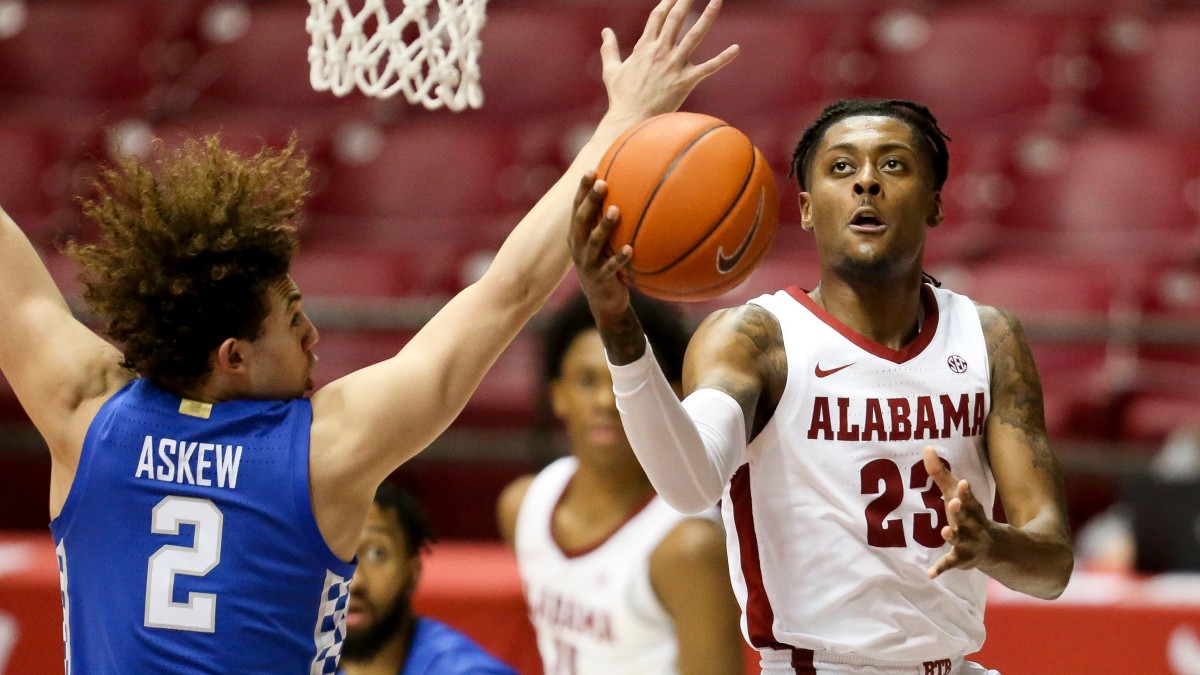
1. Alabama Crimson Tide
Overview: Surprised to see the Tide on top? Alabama has lost two of its last five, but this team has the profile to be a giant-slayer in March. Alabama ranks second in defensive efficiency and 25th in offensive efficiency and features a balanced attack, with four players averaging over 11 points per game.
How they beat Gonzaga or Baylor: Alabama is excellent at defending the three, crucial in a matchup with Gonzaga and even more so against Baylor. The Tide shoot well from deep, ranking 59th in three-point percentage (36.6%), and rank second nationally in three-point field goal attempts. Over-reliance on threes can be a slippery slope, but since Alabama pairs that approach with smothering defense and a tempo that few teams can match, it can beat anybody on the right night. Gonzaga and Baylor remain the title favorites, but if Alabama pulls off a national championship run in men’s hoops three months after Nick Saban reeled in yet another perfect season, don’t say we didn’t warn you.
